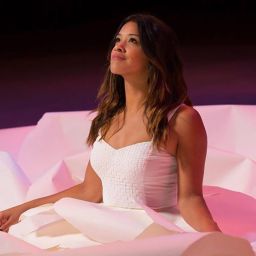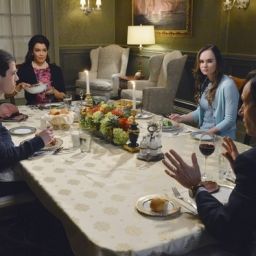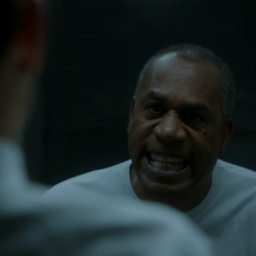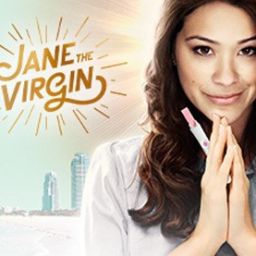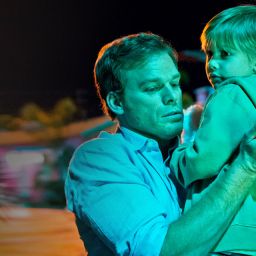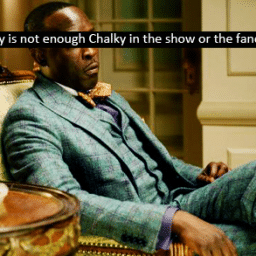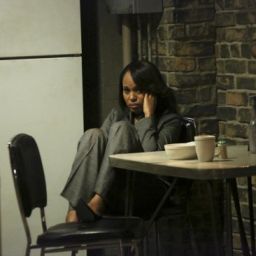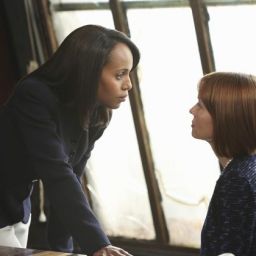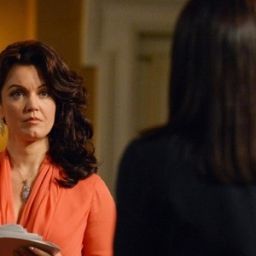This is a discussion between TLF publisher, Keidra Chaney and editor-at-large, Vivian Obarski.
KC: I just saw the latest Mindy Project where Mindy dates another Indian-descent guy who calls her a “coconut” (also known as “banana” or “oreo” depending on your background) and the show later gets into her getting more in tune with her Indian identity. It was not a perfect episode (TMP is generally an imperfect show for me when it comes to humor), but it got me thinking about how we don’t really see shows address issues of race outside of how people of color interact with white people.
Those kind of 201 level issues of race, ethnicity and culture are just so rare to see on TV, even though we’re seeing more of it, like with shows like Master of None and Blackish and such. Especially as a black woman who’s the descendant of slaves, it is always interesting for me to see the issue of assimilation on TV addressed and how it plays out for first generation kids of immigrants. At one point Mindy quips to the guy she was on the date with “Immigrants are supposed to assimilate, like Barack Obama when he came from Kenya, or Ted Cruz when he came from Canada.”
It got me thinking that one element of having more POC showrunners is that maybe TV shows can finally look at issues of race outside of just black and white and the undercovered topic of relations between POC or even people of the same race (colorism, class etc.)
I know you had some opinions about how Master of None approached this as well, but I wanted to ask you if you felt about where we are with 201 level representation on TV.
VO: For me, I’m more amazed we’re seeing the “coconut” discussion. That’s something that we wouldn’t have seen ten years, let alone, twenty years ago. But the very fact that people are trying to get ethnic backgrounds right for Asian casting — everyone, except Randall Park, is Chinese-American in the Huang family on Fresh off the Boat — is a huge boost to me in comparison to All American Girl which forced a Korean-American experience into a pan-Asian thing.
So it’s leaps and bounds. Especially with discussion about the relationship with first generation kids and immigrant parents — we’re finally seeing something because those folks are getting into positions of power in the media so we get to see race discussion go beyond what we’re used to seeing.
You see discussions of immigration not just in The Mindy Project, but also Jane the Virgin. The fact that Alba only speaks Spanish and her family replies in English is one of those things that not everyone will pick up on except probably kids with immigrant parents or grandparents. I’m not Latino, but that rings very true in my family and with my grandmother. Hell, even Fresh off the Boat having Grandma only speak in Chinese is another truth with the immigrant life.
The “Parents” episode of Master of None left an ache in my heart because it describes the gulf between parents and children and how kids won’t get the sacrifices a parent does. Dev and Brian try to, but at the end it’s not a kiss-hug-all-is-well thing with their parents. There’s still that gulf between them, but at least it’s not as huge. Brian even talking about the difference between white parents and his parents was another truism for me. The friendly relationship Jane has with her mother and grandmother is something I don’t have. But that weirdness Brian has with his parents? Totally my life.
But I don’t think that we’re at the point yet where we’re willing to show the brutal truth of inter-racial conflicts. Fresh off the Boat tried to touch on that during the pilot with Walter and Eddie, but quickly moved away from it. Which was kind of disappointing, but not surprising. I wasn’t surprised because it’s a family sitcom and putting that in was a risky move. And maybe they shouldn’t have needed to — the fact that we had a Chinese-American family sitcom was big enough in the moment.
However it feels like we’re missing a piece of life in America — there is conflict between different racial groups. Aziz Ansari got flack for writing a complaint by Dev that African-American issues get more light in media vs other ethnic groups, but it’s a frustration I’ve heard before. The resolution of that scene I don’t think was supposed to be educational, but more of a reflection of life.
But I’m not sure how one would do that without creating a huge thinkpiece perfect storm in this day and age.
KC: That’s the frustrating part about online culture currently, which I have talked a bit about on Twitter recently, that disagreement gets automatically conflated with an attack, so difficult conversations about … well pretty much anything, can’t really occur without it getting personal or resulting in hurt feelings. But that’s a different conversation for a different time.
Going back to your point, however, we do need to see more of those difficult inter/intra-racial conversations and relationships on television. One of the big problems I see with TV portrayal of race is that it’s almost always framed from a very dualistic black vs white binary, and the hypervisibility of that framing puts us back at square one, when there’s a need to have more nuanced conversation about race between people of color.
It’s not just TV, we as POC are not having enough of those 201 level conversations in person, but TV sets a tone, and it’s hard to move forward with really sophisticated topics of race and culture if we constantly go back to the “black vs. white – oh, and here’s an asian and/or latinx person occasionally” framing of storytelling on TV. I feel like what was attempted on Master of None was an imperfect start that can only improve with more people of color as showrunners and writers telling their stories.
I was really intrigued with how Fresh off the Boat handled those first tense interactions between Walter and Eddie and I think the first season in general was a bit better about exploring that tension of immigrants and assimilation. I thought it was cool that it wasn’t the usual “fish out of water” trope that was used a lot in the 80’s. The second season, though, it’s become a bit more of a traditional family sitcom and some of that tension is missed by me.
What I really want to see more of though, is that exploration of intra-racial relationships – not under the guise of dating and romance, which I think is expected – but really getting into some of the issues that involve communities of people of color and how we all relate to each other, but not how we relate to each other for the gaze of white people?
VO: I totally get that. And I feel like Fresh of the Boat came soooo close with Walter and Eddie, especially in the pilot as Eddie got to sit with the white kids instead of Walter. Every time Walter said “Really?” I started laughing because it was a subtle nod to the tensions, but in a funny way. I think they backed off from that because of accusations of being anti-black.
The weird part for me was that Walter and Eddie so quickly forgot that rivalry thanks to a Beastie Boys concert. Not even that they saw each other at the concert and bonded, but over a t-shirt. But maybe that’s a fandom discussion — how you see someone rocking something you like and it creates a bond. I just feel like that should’ve been a little more hard-won you know? Also we don’t see Walter’s family, which could create some interesting conflicts between the two kids if their parents don’t get along.
I think some of this is a matter of the diversity in the writer’s rooms and showrunners. There’s still a lot of “the only one” going on in there and that’s gotta affect discussion. Just because we’ve got Shonda running Thursday nights doesn’t mean that diversity in media is solved and we can go home happy. One person of color in the room doesn’t make it diverse.
If a writers’ room can be more diverse, then I think we’ll see more of those interracial conflicts onscreen, which would make for more compelling television. And maybe a nice side effect of this will be a lessening of the idea that a POC show/actor/writer/showrunner has to be everything to everyone.
KC: I think we’re getting closer and closer to that reality. And what’s more, I do think we see connections between people of color watching show that are not necessarily about us. A friend of mine who’s an Asian-American woman is a big fan of Being Mary Jane, and she mentioned that even though she’s not black, as a professional woman of color she saw a lot of similarities in Mary Jane’s experiences and her own, and finds it appealing on that level.
I think of how much Jane The Virgin’s three generations of women and their closeness reminds me of how I grew up with my sister, mom and grandma. That’s awesome to me, because it means that a great next step towards that 201 level representation that really shows people of color, living, loving and working with each other.
One of the things that has emerged from social media, particularly on Twitter, is that it’s really opened dialogue between people of color, and it’s those rough conversations that traditionally have been avoided out of “politeness”: anti-blackness, the model minority trope, colorism, language barriers. The #oscarssowhite, #notyourmule, and #whitewashedout hashtags have really opened up some tough conversation that’s not always pretty but essential for us all as communities of color to build those coalitions and partnerships that will eventually uplift us all.
Just imagine what could happen if these kind of conversations happened in a writer’s room? Imagine what kind of storylines and character development could come from it? The only way that we will be able to see those kind of stories if by more diverse representation in the writer’s rooms. We’re never going to get the kind of stories that ring true if they’re mostly written by people unqualified to tell those stories.
VO: Totally! But it’s not just the writer’s room. Executives and studios have to be willing to take the chance to foster these shows and talent like this. You can’t do something like Peter Liang and Akai Gurley in a ripped-from-the-headlines Law and Order episode. It would end up watering down the whole thing to something akin to Race Relations 101, which this isn’t. That demands a diverse writing staff who gets the different race relations, a strong and diverse cast (which means not one of each race, but maybe a majority-minority thing) and a studio willing to back something that isn’t palatable to the mainstream audience. All of those are major hurdles right now.
I still get frustrated when people say that shows that have inclusive writers, cast and crew are pandering or don’t make money. If you watch the success of Master of None, the Fast and Furious franchise (which we can joke about the plot, but seriously, white action stars have made as thinly-storied movies), Orange is the New Black and other shows, it’s clear that the audience is hungry for something more. I think that audiences are intelligent enough to handle going up a level in race relations studies.


